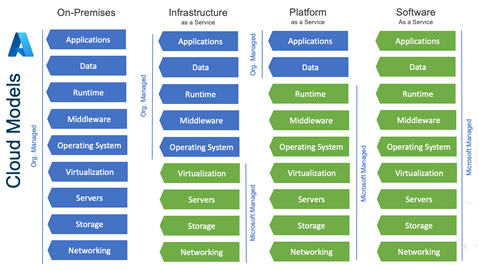Microsoft Azure, used by 95% of the Fortune 500, is clearly one of the leading platforms to consider for cloud and hybrid deployments. With a global presence and over 200 products and cloud services, Azure enables companies to build, run and manage applications on-premises, across multiple-clouds, and at the edge with a variety of tools and frameworks.
Enterprise customers typically use Azure for three primary service models:
- Infrastructure as a Service (IaaS) for processing data on virtual machines (VMs).
- Platform as a Service (PaaS) for DevOps, for developing and testing applications; and
- Software as a Service (SaaS) for using applications (e.g., Office 365 or Salesforce CRM) through the web.

Network and Cloud Delivery Models
With Azure, companies expect to gain key benefits:
- Service Speed: Competitive differentiation comes in part from the pace at which teams can develop, test and deploy applications, scale, recover data and use AI/ML to process data with robust templates and automation.
- Flexibility: The ability to control service levels to manage resources as business changes, define storage and backup locations, and incorporate all coding languages and frameworks in open source provides ultimate flexibility for apps, products and services.
- Integrated Delivery: With a unified platform, DevOps teams get end-to-end source control, testing, integration and delivery in a single environment to avoid disruptions to existing apps and services from patches, combined features or service level changes.
- Disaster Recovery: Uptime is critical and depends on compliance, backups, virtual system testing and eliminating potential disruptions.
- Security: Proactive multi-layer security is essential for data and infrastructure protection.
Infoblox enhances these benefits by offering the industry-leading platform for DNS and IP address management (IPAM) for Microsoft Azure. As a Microsoft partner, Infoblox has offered Azure integrations since 2016. Infoblox support for Azure extends enterprise-grade core network services for both physical and virtual appliances to deliver single-point visibility and control whether on-premises or in hybrid multi-cloud deployments. Infoblox DNS and IPAM services are highly secure, enabling unified service between traditional networks and Microsoft Azure for the hybrid cloud. Moreover, configurable, automated discovery adds visibility across Azure Virtual Networks and Virtual Workloads, ensures compliance and minimizes security risks. Plus, automated DNS and IP address provisioning reduces manual overhead and time to deploy and reclaim virtual instances.
With Infoblox’s 8.6.1 release, organizations can operate virtual appliances on both Azure and Azure Stack. This on-premises cloud integration allows teams to run Infoblox DNS and IPAM, DHCP services and vDiscovery for detecting resources and cloud endpoints from within Azure Stack. This functionality is also expanded to support Azure Stack Government. Infoblox enterprise-grade core network services for Azure and Azure Stack provide the ultimate flexibility and scalability for Azure deployments.
If you’d like to learn more, Infoblox can help. See our resources below, visit our website or contact an Infoblox account team member for more information.
Learn more
Demo Video: Infoblox Cloud Integration with Microsoft Azure
Demo Video: Deploying Infoblox BloxOne On-Prem Hosts on Microsoft Azure
Website: Infoblox for Private Cloud/Virtualization
Datasheet: Infoblox DNS and IPAM for Microsoft Azure
Installation Guide: Infoblox vNIOS for Microsoft Azure
Website: Infoblox Support and Service









